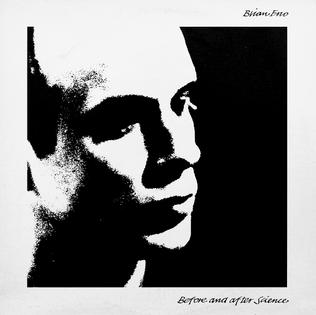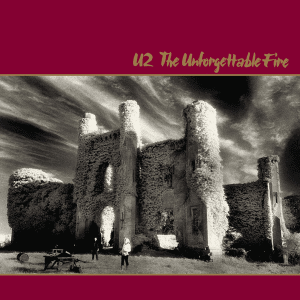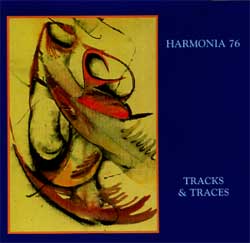
Roxy Music are an English rock band formed in 1971 by lead vocalist and principal songwriter Bryan Ferry and bassist Graham Simpson. By the time the band recorded their first album in 1972, Ferry and Simpson were joined by saxophonist and oboist Andy Mackay, guitarist Phil Manzanera, drummer Paul Thompson and synthesizer player Brian Eno. Other members over the years include keyboardist and violinist Eddie Jobson and bassist John Gustafson. The band split in 1976, reformed in 1978 and split again in 1983. In 2001, Ferry, Mackay, Manzanera and Thompson reunited for a concert tour and have toured together intermittently ever since, most recently in 2022 to celebrate the 50th anniversary of their first album. Ferry has also frequently enlisted band members as backing musicians during his solo career.

Before and After Science is the fifth solo studio album by Brian Eno, originally released by Polydor Records in December 1977 in the United Kingdom and by Island U.S. soon after. Produced by Eno and Rhett Davies, it is the first of Eno's popular music works to be published under his full name.
Oblique Strategies is a card-based method for promoting creativity jointly created by musician/artist Brian Eno and multimedia artist Peter Schmidt, first published in 1975. Physically, it takes the form of a deck of 7-by-9-centimetre printed cards in a black box. Each card offers a challenging constraint intended to help artists break creative blocks by encouraging lateral thinking.

Remain in Light is the fourth studio album by the American rock band Talking Heads, released on October 8, 1980, by Sire Records. Produced by Brian Eno, his third album with the band, the audio was recorded at Compass Point Studios in the Bahamas and Sigma Sound Studios in Philadelphia during July and August 1980.

The Unforgettable Fire is the fourth studio album by Irish rock band U2. It was produced by Brian Eno and Daniel Lanois, and released on 1 October 1984 by Island Records. The band wanted to pursue a new musical direction following the harder-hitting rock of their previous album, War (1983). As a result, they employed Eno and Lanois to produce and assist in their experimentation with a more ambient sound. The resulting change in direction was at the time the band's most dramatic. The album's title is a reference to "The Unforgettable Fire", an art exhibit about the atomic bombing of Hiroshima.

Here Come the Warm Jets is the debut solo album by Brian Eno, released on Island Records on 8 February 1974. It was recorded and produced by Eno following his departure from Roxy Music, and blends glam and pop stylings with avant-garde approaches. The album features numerous guests, including several of Eno's former Roxy Music bandmates along with members of Hawkwind, Matching Mole, Pink Fairies, Sharks, Sweetfeed, and King Crimson. Eno devised unusual methods and instructions to coax unexpected results from the various musicians.
An art diary, art journal or visual journal is a daily journal kept by artists, often containing both words and sketches, and occasionally including mixed media elements such as collages. Such books will frequently contain rough workings, in cartoon form, of ideas later to appear in finished works, as well as acting as a normal diary, by allowing the artist to record their day-to-day activities and emotions.

Another Day on Earth is the twenty-second solo studio album by Brian Eno, released on 13 June 2005 in the UK and Europe through Hannibal Records, and on 14 June 2005 in the US. The album predominantly recorded and mixed on Macintosh software, using Logic Pro, over a period of four years.
"Warszawa" is a mostly instrumental song by David Bowie and Brian Eno originally released in 1977 on the album Low. The band Joy Division was initially called Warsaw as a reference to this song.

The New Oxford Book of Carols is a collection of vocal scores of Christmas carols. It was first published in 1992 by Oxford University Press (OUP) and was edited by Hugh Keyte and Andrew Parrott. It is a widely used source of carols in among choirs and church congregations in Britain.

Wah Wah is the sixth studio album by the Manchester-based English indie rock band James. After the success of their fourth album, Seven (1992), the band entered Real World Studios, Box, Wiltshire, to record their fifth album Laid in early 1993 with producer Brian Eno, with whom the group had longed to work. Prior to recording Laid, Eno observed the band's jam sessions at their Manchester rehearsal room, and considered these improvised pieces to be as important to the band's music as their eventually crafted songs. He requested to the group that whilst they were recording Laid, they would also concurrently record an album of their improvisations which Eno and, by Eno's request, second producer Markus Dravs would produce in a secondary studio in the Real World complex. Each composition started off with the band's improvisation being recorded, which Dravs would then edit, generally alone whilst James and Eno were recording Laid. Eno and Dravs would take a "promising" part of a recording and then mixed them only once. Tim Booth's desire to re-record some of his vocals caused friction in the studio.
Russell Mills is a British artist who was born in Ripon, Yorkshire, England in 1952. He has produced record covers and book covers for Brian Eno, the Cocteau Twins, Michael Nyman, David Sylvian, Peter Gabriel, and Nine Inch Nails.

More Blank Than Frank and Desert Island Selection are 1986 compilation albums of music by Brian Eno. More Blank Than Frank is the title given to the vinyl LP and cassette releases, and Desert Island Selection is the name used for the CD version. The three versions were issued at the same time, though they differ somewhat in the ordering and in the songs that were used. The LP features 10 tracks, the cassette, 12, and the CD, 11.
"Arrival" is a 1976 composition by Swedish pop group ABBA featured on their album of the same name. It is an instrumental piece, mainly the brainchild of member Benny Andersson and had the working titles of "Fiol", "Ode to Dalecarlia" and "Arrival in Dalecarlia".

More Music for Films is a compilation album by British musician Brian Eno, released in 2005.

Tracks and Traces is a collaborative album by German kosmische supergroup Harmonia and British musician Brian Eno, initially credited to Harmonia 76. Eno joined the group at Harmonia's studio in Forst, Germany for the September 1976 recording sessions.

Brian Peter George St John le Baptiste de la Salle Eno, also known by the mononym Eno, is an English musician, composer, record producer and visual artist. He is best known for his pioneering contributions to ambient music and electronica, and for producing, recording, and writing works in rock and pop music. A self-described "non-musician", Eno has helped introduce unconventional concepts and approaches to contemporary music. He has been described as one of popular music's most influential and innovative figures. In 2019, he was inducted into the Rock and Roll Hall of Fame as a member of Roxy Music.
"Slug" is a song by Passengers, a side project of rock band U2 and musician Brian Eno. It is the second track on Passengers' only release, the 1995 album Original Soundtracks 1. The track was originally titled "Seibu" and was almost left off the album before it was rediscovered later during the recording sessions. Though Eno made most of the creative decisions during the recording sessions, "Slug" was one of the few tracks that the members from U2 tried to craft themselves.

(No Pussyfooting) is the debut studio album by the British duo Fripp & Eno, released in 1973. (No Pussyfooting) was the first of three major collaborations between the musicians, growing out of Brian Eno's early tape delay looping experiments and Robert Fripp's "Frippertronics" electric guitar technique.
"People Take Pictures of Each Other" is a song by the English rock band the Kinks from their sixth studio album, The Kinks Are the Village Green Preservation Society (1968). Written and sung by Ray Davies, the song was recorded in July 1968. The song features a breathless vocal from Davies as well as harpsichord and piano from Nicky Hopkins, which was likely the last contribution he ever made to a Kinks recording.













